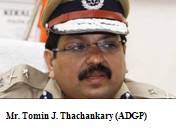 Referring to the Additional Director General of Police (ADGP), Mr. Tomin J. Thachankary, the former State Police Chief, Mr. Senkumar, has said that this officer is a butcher stationed at the state police headquarters. Allegations against Thachankary, one of the senior most officers in service in the state, is nothing new. The only difference this time is that the public statement against Thachankary is made by his immediate superior officer, who is privy to Thachankary’s personal file in the department.
Referring to the Additional Director General of Police (ADGP), Mr. Tomin J. Thachankary, the former State Police Chief, Mr. Senkumar, has said that this officer is a butcher stationed at the state police headquarters. Allegations against Thachankary, one of the senior most officers in service in the state, is nothing new. The only difference this time is that the public statement against Thachankary is made by his immediate superior officer, who is privy to Thachankary’s personal file in the department.
Thachankary is an officer against whom, over the years, allegations of varying nature have mounted. Among many, one of the serious complaints against this officer was his unapproved visit to the middle eastern countries, about which the then Indian Ambassador in Qatar, Ms. Deepa Gopalan Wadhwa, had filed a report to the Union Ministry of External Affairs. Based on this report, an inquiry was ordered by the National Investigation Agency. What came about of this enquiry is not public.
Thachankary was twice suspended from service. On the first occasion this officer was reinstated into service on the condition that he should not be appointed in key positions. This officer has a volley of accusations against him, including but not limited to: (i) engaging in and benefiting from the illegal business of selling pirated CDs and DVDs; (ii) having found in possession of wealth contradicting to his known sources of income; and (iii) trying to illegally assist accused in criminal cases by interfering in investigations.
On 16 June 2017, the High Court of the state, in a public interest litigation, has asked the state government to submit in the court, records concerning an anti-corruption enquiry against this officer. The court also expressed concern regarding the decision by the state government to appoint this officer with such tainted credentials in a key position at the state police headquarters.
Thachankary has six years and six months to retire. By all probabilities he too will serve his entire tenure and retire from service with full pension. And, it cannot be ruled out, that in between, he might also become the head of the state police force. In between, the damage to the institution such an officer will do is anyone’s guess.
Senkumar, since his retirement from the state police service on 30 June 2017, has been giving a marathon of media interviews. In all the interviews, he has stood firm on the remark that he has made during his retirement speech, that the state police have within its ranks, criminals in uniform. The AHRC has issued a statement concerning this, on 30 June, which is available here.
Officer Thachankary is only a microscopic specimen of a much larger problem that has adversely affected the police department. Criminality within the police service is a serious problem in India. Invariably in all cases an officer accused of a crime is able to continue in the service, due to the patronage and protection such officers receive from the political parties that form governments. In most cases, these officers are protected by the government, across political divisions. Thachankary is an example here too.
Within the past 10 years, the state of Kerala has had two diametrically opposite political parties in power. However, Thachankary was able to remain in office during the previous government, and now posted at the state police headquarters, by the incumbent government. In one of the interviews Senkumar recalls a personal experience, highlighting yet another patronage such officers with criminal background receive. Senkumar said that in Thachankary’s case, on one occasion, at least eight religious leaders intervened to protect Thachankary from disciplinary actions. And the government obliged.
Impunity to criminality within Indian police service greys all lines. It negates the very notion of fair trial and the rule of law. Politics, religion, caste, and financial clout, all plays a role in protecting criminals in uniform. Besides, there are no independent agencies in the country that are mandated and equipped to investigate and prosecute complaints against police officers.
The current state of policing in India has resulted in the people having zero trust in the institution. The reason why, despite this, the people approach the police is because they have no other alternative.
Policing is the linchpin that holds together the vehicle of criminal justice process in a country. Even the minutest problems within this institution will seriously impact the criminal justice process many folds.
Ending criminality within the police service has no other alternative other than to investigate and prosecute officers who are engaged in crimes. This will require creating an independent institution with resources and mandate to undertake such a task. This task is not simple, and will require resources, and time. Unfortunately, at this moment, nowhere in India such a capable institution exists. Until this happens, the ordinary public will treat India’s criminal justice process a farce.